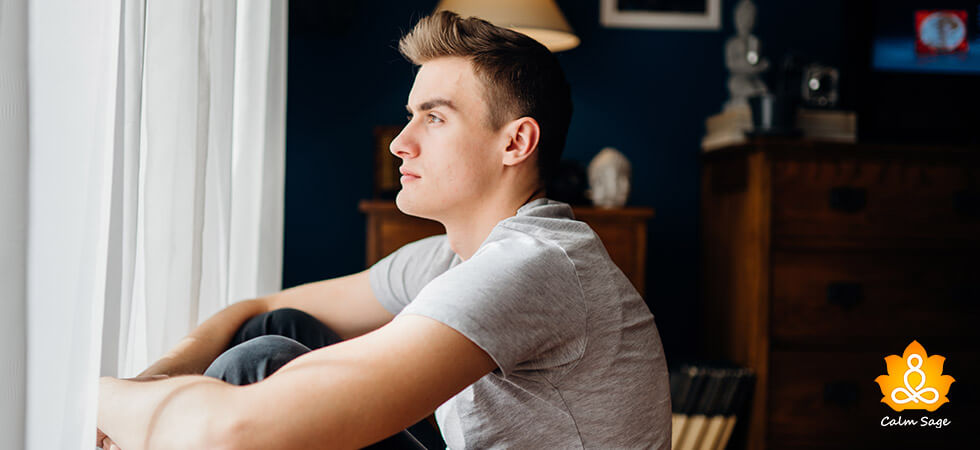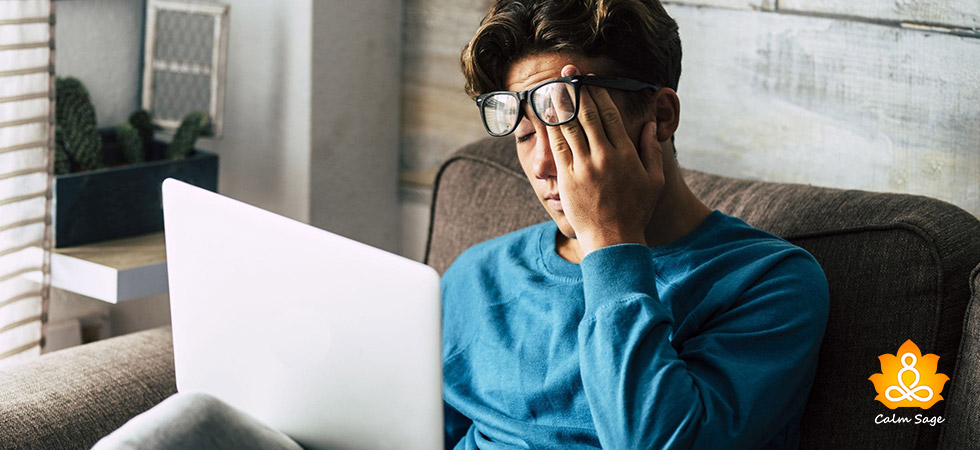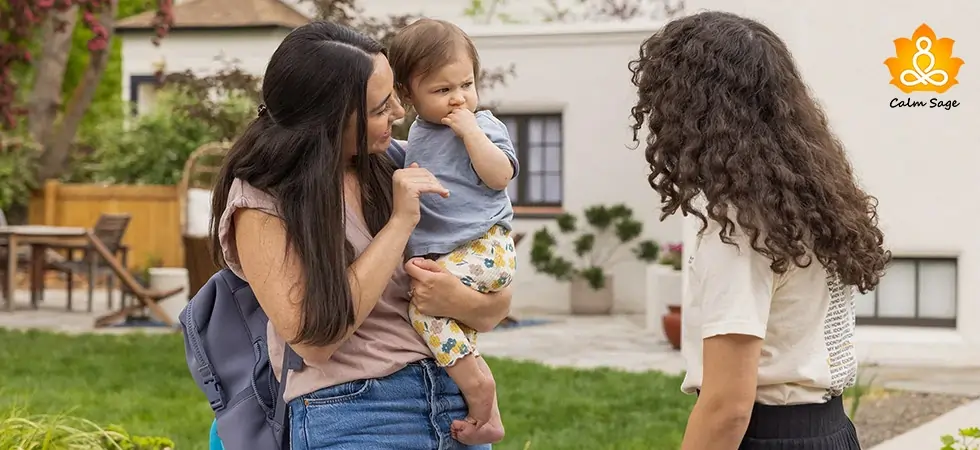Accepting Anxiety Only Makes You Stronger | 7 Ways To Accept Anxiety

Despite what we think, we feel comfortable in our suffering. This faux acceptance is due to our fear of the unknown. Because we don’t know what lies in our future, we prefer to side with our sufferings as they are familiar to us. I believe that this is one of the reasons we have trouble accepting anxiety as a part of us.
Because we fear that once we accept anxiety, we’ll have to face the uncertainties of the unknown as well.
What we conveniently forget is that anxiety comes and goes and everyone (even that awful coworker, and yes, your terrible neighbor too) can experience anxiety from time to time. When you treat anxiety as the relative you resent, you unknowingly give it the power to control you.
Don’t worry, we’ve all been there. We all feel comfortable in our anxiety because that’s familiar. Not being able to lean on the familiar discomfort of anxiety can make you feel off-kilter. I understand that. So why can’t we seem to accept anxiety yet? And why should we accept anxiety?
The way you look at anxiety can change your life’s perspective. Accepting anxiety is not a task, it’s a transformative experience. You might find yourself struggling to overcome anxiety, but you can always find ways to accept anxiety and feel empowered by reframing the way you look at anxiety.
Let’s take a look at how you can do that!
The Importance Of Accepting Anxiety
Anxiety comes and goes, which is not so bad as anxiety can keep us motivated and, on our toes, but when it prolongs, it can do some damage that we might feel uncomfortable. Anxiety activates our flight-fight-freeze response, the stress response that protects us from anything our brains and bodies might find threatening.
We need anxiety or the stress response to protect ourselves, however, there are times when our brains get confused and can’t tell the difference between life-threatening situations and minor inconveniences; making our anxiety go skyrocket.
Accepting anxiety is the cure though. If you accept anxiety, you’ll understand what it feels like, how to incorporate it into your lives, and how to use it to your advantage. I’m not saying that you should not experience anxiety at all.
That’s not the point. The point is to acknowledge and accept that anxiety is a part of our lives and not doing so might make you miss out on cues that are supposed to protect you from danger.
Accepting anxiety can also help you balance your work and life. When you adjust your lifestyle around your anxiety; for example, by taking time to participate in expressive art therapy; you slow down your life pace and carve out personal as well as professional time.
Another importance of accepting anxiety is that it helps you stay motivated and excited. Instead of saying to yourself, “I am anxious”, say, “I am excited”; the moment you reframe your anxiety, you’ll get the motivation to deal with whatever’s making you anxious.
Anxiety is one of the most common mental health conditions in the world, but what many people fail to realize is that anxiety can act as your friend and not your enemy in many high-pressure situations. When you accept and value your anxiety, you learn to deal with it on your terms, which makes you feel in charge and control than out of it.
Amazing, isn’t it? How accepting anxiety can change your perspective? Now, let’s take a look at how to accept anxiety and feel empowered instead of powerless.
How To Accept Anxiety? 7 Ways To Try!
1. Incorporate Mindfulness
Mindfulness means being aware of your present and not dwelling on the past or the future. Incorporating mindfulness into your routine will allow you to accept anxiety and the discomfort that comes with it.
This practice will help you understand that you can allow anxiety in your life without it overwhelming you. Try this; when you feel the symptoms of anxiety, acknowledge them, but don’t act upon them. Observe them and let them pass.
2. Try Journaling
Journaling can be good for your mental and emotional health. When you feel anxious, you can just pen down your thoughts in a journal. This way, not only will you learn your emotions and the source of your anxiety, but you’ll also find yourself accepting your anxiety.
Try answering these questions for a start;
- What is making you anxious?
- What can you control at this moment?
- What do you think about your anxiety?
This will help you figure out where your anxiety has a purpose and where it shouldn’t be taken as seriously.
3. Take Care Of Your Needs
Your anxiety can have its reasons too. As I’ve said, think of anxiety as a friend and not as an enemy. Let your anxiety tell you what you need at the moment. What is your anxiety telling you? Why are you anxious?
Maybe your needs are unmet, and those needs are making them known through your anxious thoughts. Take care of yourself! If your body tells you that you need a break, then take it!
4. Do What You Love Doing
Another way you can accept anxiety is by doing what matters to you, what you love doing. Here, look at your values as well. Do you crave adventure? Or is it that being independent is what you’re looking for?
Learn what you love and let it be in your life. For example, if you crave adventure, then accept that impromptu trip invitation, even if it gives you butterflies in your stomach.
5. Challenge Your Thoughts
Anxiety can be a false alarm as well, don’t forget that. So when you feel anxious, challenge your thoughts and question where they are coming from. If you feel scared and nervous, ask yourself; “Is my fear realistic?” “Is the fear too bad?”
For just a moment, pause and collect your thoughts so that the anxiety can’t hold the same control over you. Accept it, but also question it.
6. Do Something Active
One of the things that we most experience when we’re anxious is our thoughts racing. Sometimes, it can be hard to stop them, so much so that we can find ourselves physically getting affected by anxiety.
In those times, the best thing to do is to do something active. When you feel the physical symptoms of anxiety, you can do something physical to counter them. Maybe try breathing exercises, go for a walk, wash your face with cold water, or go take a bath.
7. Most Importantly, Don’t Avoid It
No matter what, don’t avoid your anxiety. The point here is to accept anxiety, and it won’t come across if you keep avoiding it. If you avoid your anxiety, it tells your mind that there’s something wrong, even if it isn’t, but accepting anxiety tells your mind that, “Yes, I’m anxious, but I’m doing something about it,”
It’s OK to feel anxious, but it’s not OK to avoid it. Distractions can be good but temporary. Long-term distractions can turn into avoidance behaviors that can make you feel worse.
What Next?
Anxiety is already a part of our lives, so it’s important to accept anxiety as it is instead of avoiding it. Anxiety might come and go, and it might not go completely, but even then it’s not a bad thing. Anxiety can be an alarm system, it can be a motivator, and it can be a friend without taking over control of your life.
Accepting anxiety is important and so is making it normal. With the above ways, you can learn to accept and reframe anxiety in your life. If you’re unsure still and need help, then you can always reach out to a professional for support.
I hope this article helped you learn how to accept anxiety without letting it control your life completely.
For more, you can write to us at info@calmsage.com or DM us on social media. You can also share your tips and thoughts with us in the comments section below.
Take Care!
Next Read:
Why Do You Get Anxiety Dreams? (What You Can Do About It)
20+ Grounding Techniques For Anxiety You Can Try To Calm Down
Do Weighted Blankets For Anxiety Work In Calming You Down?
11 Surprising Yet Common Life Stressors That May Trigger Your Anxiety




















